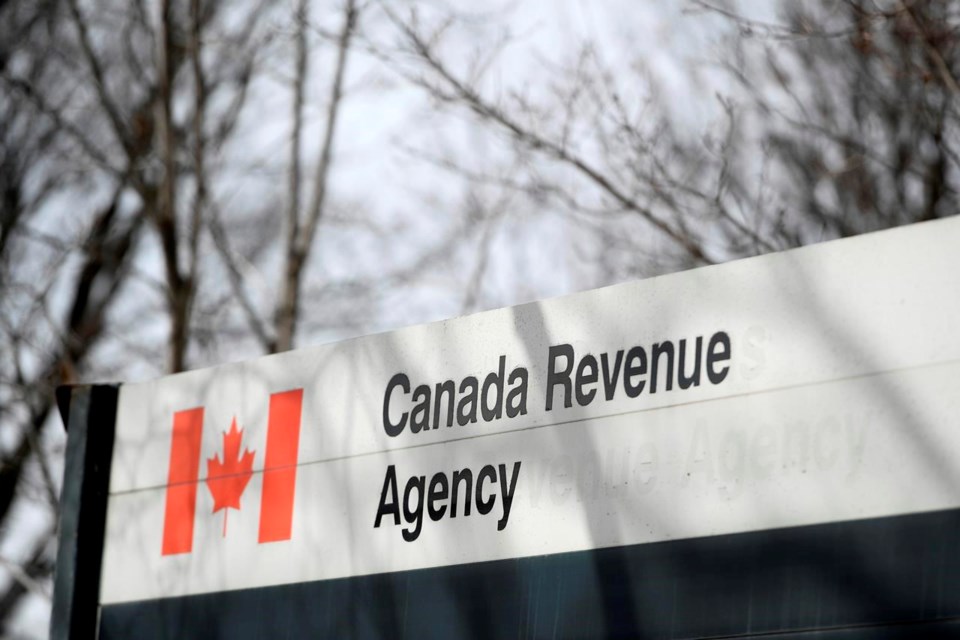OTTAWA — The Canada Revenue Agency kicked off its tax season this week by urging Canadians to file their taxes on time — and reminding them that they may be owed money.
The filing deadline of April 30 falls on a Sunday this year, so Canadians have until May 1 to finish filing their taxes. But a looming strike for CRA workers may be on the horizon.
Here's a look at what you need to know, and at some of the new benefits you may qualify for this year.
It's faster to file taxes online
CRA assistant commissioner Gillian Pranke, who is in charge of this tax season, is encouraging people to file their taxes online. She said 92 per cent of Canadians filed online last year.
"For individuals who are signed up for direct deposit and file electronically, they can expect to get their refund within about eight days," Pranke said.
For those who file via mail, the process of getting a refund can take up to eight weeks.
The government might owe you money
Canadians who don't file their taxes can miss out on money they're owed.
In the fall, the CRA said about $1.4 billion in uncashed checks was sitting in its coffers.
Pranke said it's a misconception that only people who owe money should file their taxes. "You might be leaving some money on the table."
New and updated benefits are available
The government has introduced or expanded some of the tax credits that Canadians can claim, including:
— First-time home buyers' tax credit. The amount used to calculate the first-time home buyers' tax credit has increased to $10,000 for homes bought after Dec. 31, 2021. That means Canadians who bought their first home last year may be eligible for a refund of up to $1,500.
— Home accessibility tax credit. This credit is available for eligible home renovations or alteration expenses aimed at making a home safer or more accessible for a person with a disability. The benefit has been enhanced this year, allowing Canadians to claim up to $20,000 in expenses.
— Climate action incentive payment. While the rebate itself is not new, as of this year, residents of Newfoundland and Labrador, Nova Scotia and Prince Edward Island are newly eligible to receive the incentive payment that offsets the cost of the federal price on carbon pollution. Residents of Alberta, Saskatchewan, Manitoba and Ontario continue to be eligible for the payments.
— Disability tax credit. The tax credit, which reduces the income tax that people with disabilities or their family members may have to pay, was updated to cover individuals who have Type 1 diabetes, effective beginning in the 2021 tax year.
— Simplified northern residents travel deduction. The CRA is launching a pilot project to make it easier for northern residents to determine the lowest return airfare, an amount required to claim travel deductions. The simplified process includes tables that identify the lowest return airfare, which are available on the government of Canada website.
A strike could create some disruptions
Marc Brière, the national president for the Union of Taxation Employees, said strike votes have been launched and are expected to conclude in early April.
Brière said he expects that CRA workers represented by the union will vote overwhelmingly in favour of taking strike action, which would affect tax filing this season.
His advice for Canadians, he said, is to file their taxes early to avoid any disruption by a potential strike.
While Pranke would not weigh in on how a strike might affect tax season, she encouraged Canadians to file their taxes online, which involves less manual work to process.
Don't be afraid to ask for help — and beware of scams
For modest-income earners, Pranke said a range of resources are available to help with the filing process, including free online software.
The CRA has also partnered with more than 3,100 community organizations that run tax clinics, and more information about these can be found on the canada.ca website.
And the agency's helpline is available to those who have missed past tax filings or are fearful of making a mistake, Pranke said.
She added a word of warning: Canadians should be vigilant to avoid falling for scam calls and text messages that claim to be from the CRA.
"When we contact you, we'll make it clear who we are. And we go to great lengths to protect client information," she said, adding that the federal agency never sends texts with links to click.
This report by The Canadian Press was first published Feb. 22, 2023.
Nojoud Al Mallees, The Canadian Press




